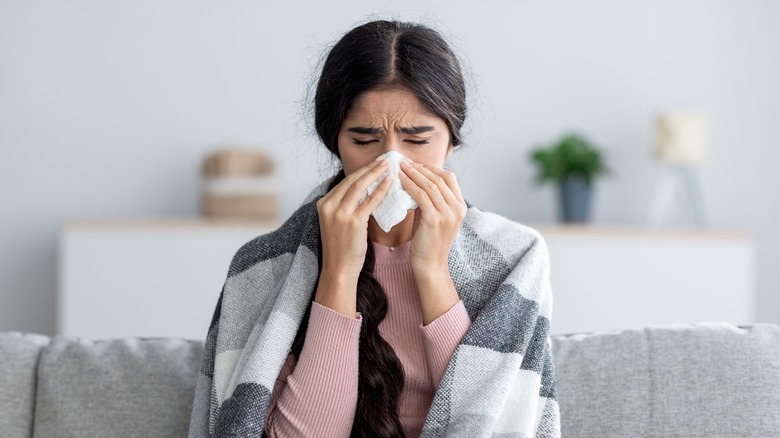How Close Are We To A Universal Flu Vaccine?
Influenza, commonly known as the flu, is a virus that infects the respiratory system. It is a highly contagious illness that can cause severe symptoms and sometimes even death. The best way to prevent serious flu symptoms is to get a flu shot every year, but today's vaccines only protect people from certain strains of the virus (via Healthline). However, scientists are currently in the process of developing a universal flu vaccine that would protect against all strains of the virus.
The National Institutes of Health is currently beginning its phase one trial for the new vaccine. About 100 individuals are participating in the trial and will be given one of three available inoculations before being monitored for the next seven months. In addition to an injection in the arm, some participants will receive an intranasal vaccine. "By trialing this universal vaccine in the nasal passageways as well as in the traditional method through the arm, scientists will be able to decipher the effective nature of the vaccine through both methods," said Dr. William Schaffner, an infectious disease expert at Vanderbilt University Medical Center in Tennessee.
The seasonal flu vaccine only protects against strains of the virus that scientists believe will be most prominent during the year. While they are often correct, a universal vaccine would be more effective and easier to roll out. Yearly booster may not even be required.
What to know about the flu
The flu is a contagious respiratory illness caused by viruses that infect the nose, throat, and lungs (via Mayo Clinic). It can cause mild to severe illness, and at times can lead to death. The best way to prevent the flu is by getting a yearly flu vaccine. Symptoms of the flu include fever, chills, coughing, sore throat, runny or stuffy nose, muscle or body aches, headaches, and fatigue. Some people may also experience vomiting and diarrhea. If you have any of these symptoms, it's important to see a doctor as soon as possible so you can get started on antiviral drugs, which can lessen the severity of your illness.
Treatment for the flu typically involves rest, plenty of fluids, and over-the-counter medications to help relieve symptoms (via WebMD). In some cases, your doctor may prescribe antiviral drugs. If you have a severe case of the flu, you may need to be hospitalized. If you're at high risk for complications from the flu, it's important to take steps to prevent getting sick. These include getting a flu vaccine every year, washing your hands often, and avoiding close contact with people who are sick. If you do get sick, it's important to stay home from work or school so you don't spread the illness to others.


